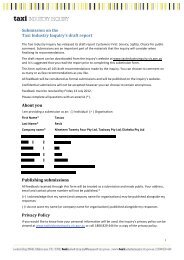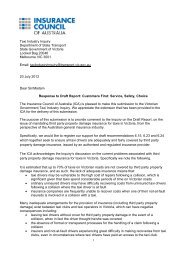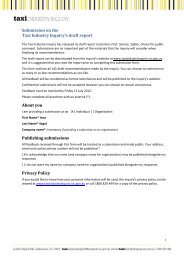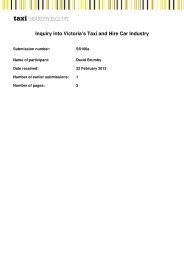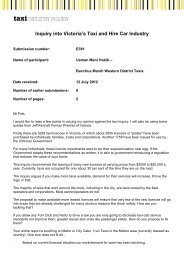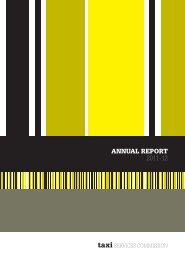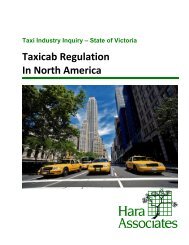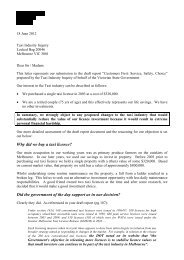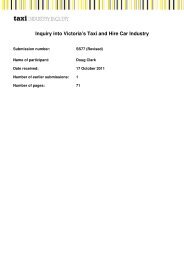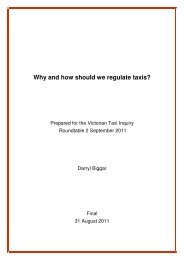Part D â Understanding and improving industry performance (PDF ...
Part D â Understanding and improving industry performance (PDF ...
Part D â Understanding and improving industry performance (PDF ...
You also want an ePaper? Increase the reach of your titles
YUMPU automatically turns print PDFs into web optimized ePapers that Google loves.
The ACCC has been called on a number of times in<br />
recent years to deliberate on mergers <strong>and</strong> acquisitions<br />
between taxi depots or NSPs. The salient points for the<br />
inquiry from these deliberations are:<br />
• The approach taken by the ACCC to market definition<br />
• The ACCC’s competition analysis, including the<br />
nature of the issues identified<br />
• The outcomes arising from the ACCC decisions,<br />
including what this might mean for the shape of the<br />
<strong>industry</strong> in the future.<br />
Analysis of the ACCC’s decisions is limited by the amount<br />
of information released by the Commission in reaching<br />
its conclusions. Much of the information received by<br />
the ACCC is retained as commercial-in-confidence<br />
material, with often only a summary of the issues or<br />
considerations available publicly. Nonetheless, the inquiry<br />
has undertaken some analysis of these decisions on<br />
the basis that there may be important lessons for how<br />
competition in NSPs has developed <strong>and</strong> may continue to<br />
develop over time.<br />
Market definition<br />
Acquisitions considered by the ACCC have usually<br />
involved markets for either the provision of radio booking<br />
services to taxi operators or the provision of pre-booked<br />
taxi services to the public. In some instances, notably<br />
where Cabcharge has been a relevant party, the relevant<br />
markets have also included those for taxi-specific noncash<br />
payment instruments or payments processing.<br />
The geographic scope of the markets identified<br />
has invariably been determined with respect to the<br />
zones within which licensed taxis operate. This is<br />
notwithst<strong>and</strong>ing evidence that some depots have<br />
stronger market positions in certain geographical areas<br />
within those zones (for example, North Suburban <strong>and</strong><br />
West Suburban Taxis). Payment markets have usually<br />
been defined nationally.<br />
The ACCC’s decision in relation to Silver Top’s attempted<br />
acquisition of North Suburban Taxis in 1995 remains the<br />
richest source of the Commission’s analysis with respect<br />
to mergers or acquisitions of NSPs <strong>and</strong> depots. 52 In<br />
that decision, the ACCC noted the following factors as<br />
supporting its market definitions:<br />
It is readily apparent that in many situations street or<br />
rank hire will be a very inferior, or no real substitute to<br />
pre-booking a taxi … Furthermore, the hiring of taxis<br />
from ranks or on the street does not appear to<br />
constrain the taxi depots in any direct competitive<br />
sense. This is particularly so when it is considered<br />
that all taxis must be affiliated with a depot. It is not at<br />
all clear that taxi depots are in any way sensibly<br />
constrained by the opportunity of passengers to<br />
street hire or the nature of competition amongst<br />
individual taxi drivers for street hire passengers.<br />
…it does not appear to the Commission that there is<br />
any substantive evidence to suggest that hire cars<br />
offer the close degree of competition that is relevant,<br />
either to other taxi operators or taxi depots, at the<br />
same time recognising that hire cars may have some<br />
degree of competitive impact generally in respect of<br />
taxi services. 53<br />
In this decision, the ACCC also noted the links between<br />
the two markets as defined above:<br />
As will become clear, it is the first market with which<br />
the Commission is particularly concerned, however<br />
recognising that the degree of competition in the<br />
first market will affect the quality <strong>and</strong> level of service<br />
in the later. 54<br />
Although this terminology was not widely used in the<br />
economic literature at the time, it is now recognised that<br />
these inter-dependencies are fundamentally important to<br />
the analysis of these kinds of markets. They are known as<br />
‘two-sided’ markets: where the role of firms within these<br />
markets is to coordinate interactions between two groups<br />
of users on either side of a transaction. Firms competing<br />
in these markets are essentially trying to solve an ongoing<br />
problem of balancing between two sets of consumers: a<br />
taxi booking service has no value to consumers if there<br />
are no vehicles attached to the depot <strong>and</strong> the booking<br />
service has no value to operators unless there are<br />
consumers who call the booking service seeking a taxi.<br />
One important implication of this is that it is not possible<br />
to fully underst<strong>and</strong> what is going on in one side of the<br />
market (such as the market for depot services) without<br />
underst<strong>and</strong>ing what is going on in the other side (such as<br />
the market for pre-booked taxi services).<br />
In general, <strong>and</strong> as noted above, the ACCC has<br />
recognised these interactions. However, in some<br />
cases the ACCC has made comments suggesting<br />
that competition for operators is much weaker than<br />
competition for customers.<br />
52 ACCC, Silver Top Taxi Service Commission Determination,<br />
16 October 1995<br />
53 Ibid., p.17<br />
54 Ibid., p.18<br />
<strong>Underst<strong>and</strong>ing</strong> <strong>industry</strong> <strong>performance</strong> CUSTOMERS FIRST 239



